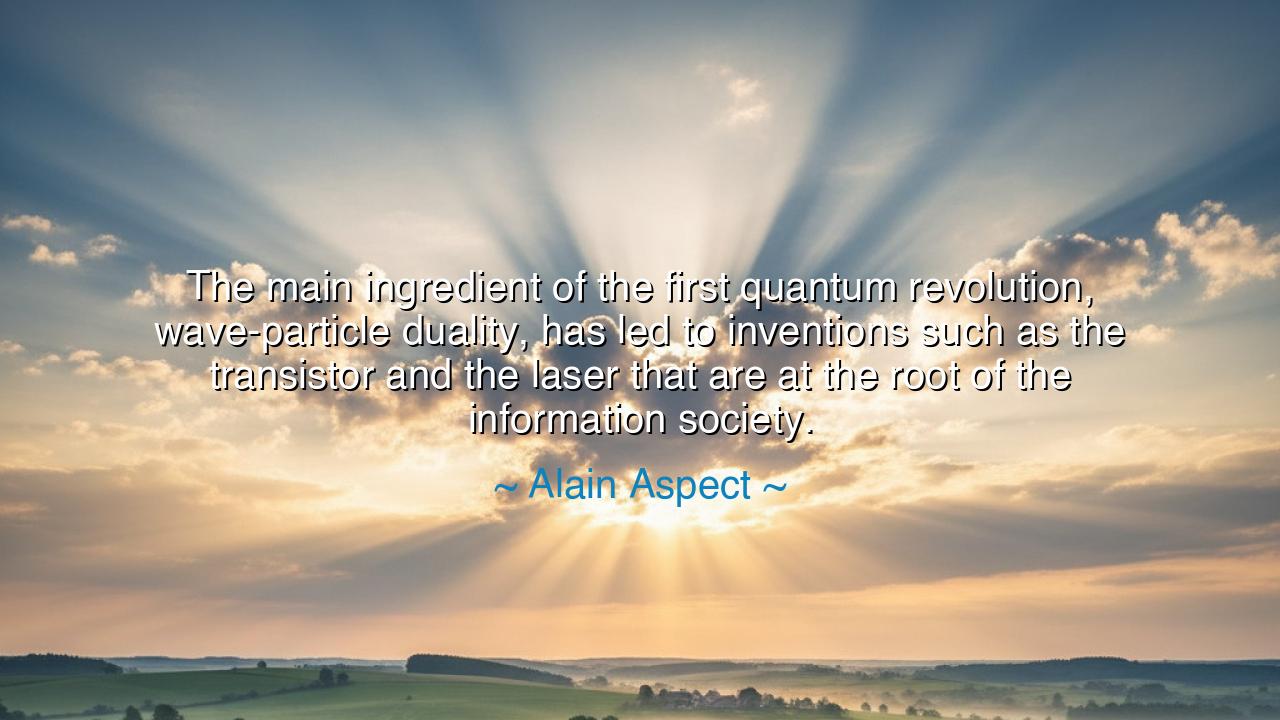
The main ingredient of the first quantum revolution
The main ingredient of the first quantum revolution, wave-particle duality, has led to inventions such as the transistor and the laser that are at the root of the information society.






Hear now the voice of Alain Aspect, a pioneer who gazed into the deepest mysteries of reality and declared: “The main ingredient of the first quantum revolution, wave-particle duality, has led to inventions such as the transistor and the laser that are at the root of the information society.” These words, though born of science, resound like prophecy, for they reveal how the invisible truths of the universe shape the destiny of mankind. They teach us that the humblest discovery, grasped in the silence of thought, can shake the world and build a new age.
What is this wave-particle duality that Aspect speaks of? It is the paradox discovered when men shone light through slits and saw it behave not as one thing but as two: both wave and particle, both spread and point, both many and one. This strange truth shattered the certainties of classical physics, proving that the world is not as simple as the eye beholds. From this revelation arose the quantum revolution, a turning point in human understanding, where the very building blocks of matter became mysteries that could no longer be explained by common sense, but only by the strange and wondrous language of quantum theory.
From these mysteries came miracles of invention. The transistor, small and unassuming, replaced great vacuum tubes and gave birth to modern computing. Without it, there would be no computers in every home, no smartphones in every hand, no digital age to unite the corners of the earth. The laser, born also of quantum principles, became a tool of immense power—cutting steel, healing eyes, carrying voices through fiber-optic cables that weave the net of our information society. Thus, from a single paradox of light and matter sprang the very foundation of the world in which we live.
Consider the story of the Bell Labs engineers in the mid-twentieth century, who, inspired by quantum theory, built the first transistor. At the time, it seemed but a modest improvement, a replacement for fragile and bulky vacuum tubes. Yet from that one invention grew the modern computer, the internet, satellites, and the entire digital web that defines our age. Here we see Aspect’s truth: that the deepest revolutions of thought are not merely for philosophers, but for all humanity, transforming how we live, speak, and dream.
Or look to the laser, once mocked as “a solution in search of a problem.” Born of quantum mechanics, it seemed to some a curiosity. Yet today it reads the discs of music, powers the beams of surgery, guides weapons, and transmits information across oceans. What was once only a play of quantum principles became the beating heart of the information society, shaping commerce, communication, and knowledge. From the paradox of wave-particle duality, humanity forged tools of power greater than kings once dreamed.
The wisdom of Aspect’s words is this: the great revolutions of history are often born not in battlefields, but in the minds of those who dare to question the nature of reality. The quantum revolution was not merely about physics—it was about humanity daring to see the world anew, to embrace paradox and uncertainty, and to draw strength from mystery itself. Our age of information, with all its power and peril, rests upon this foundation: the willingness of a few to ask strange questions and endure stranger answers.
The lesson for us, then, is clear. Cherish the seekers, the thinkers, the questioners who probe beyond the surface of things. Do not scorn paradox, for in it may lie the seed of transformation. In your own life, when confronted with the strange or the uncertain, do not turn away. Embrace it, study it, and let it shape you. For as the transistor and the laser arose from the paradox of light, so too may your greatest achievements be born from what once seemed impossible.
Therefore, O listener, let your actions be these: honor the hidden mysteries, cultivate patience for the unseen, and remember that today’s confusion may be tomorrow’s revolution. Teach the next generation not only facts, but wonder. For as Aspect has shown, the roots of our information society lie not in certainties, but in questions—and it is by daring to live in the space between wave and particle, between known and unknown, that humanity builds its future.






AAdministratorAdministrator
Welcome, honored guests. Please leave a comment, we will respond soon